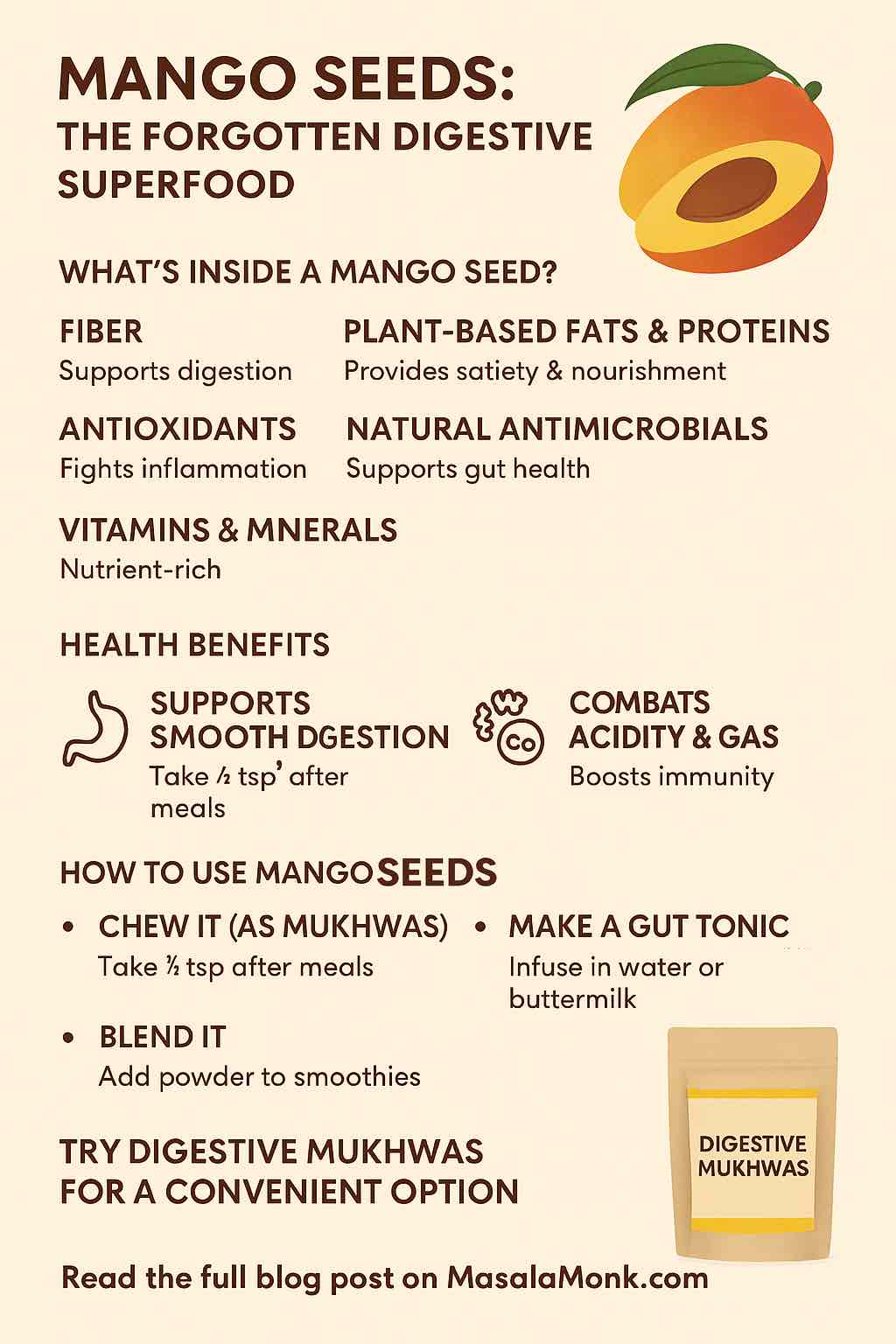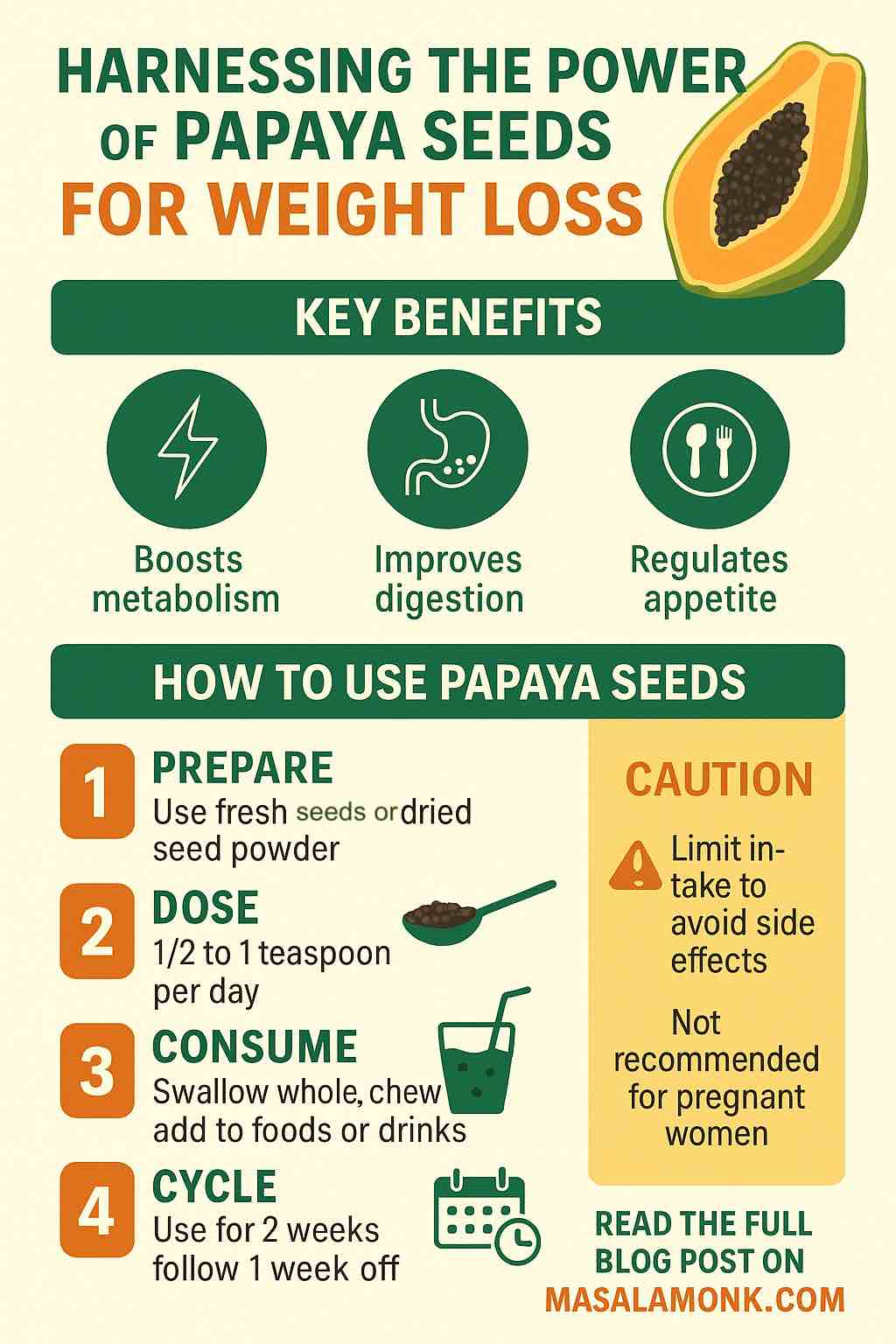
We all love mangoes — juicy, sweet, and brimming with tropical flavor. But what if the hard seed you throw away could be the most valuable part of the fruit?
Yes, the mango seed kernel, hidden inside that fibrous pit, has long been used in traditional practices for everything from digestive relief to immune support. And now, as more people turn toward natural, gut-friendly solutions, this overlooked powerhouse is making a quiet comeback — especially as a key ingredient in Digestive Mukhwas, a classic Indian post-meal seed mix.
Here’s everything you need to know about mango seeds, how to use them, and why they’re the missing piece in your wellness routine.
🌿 What’s in a Mango Seed?
Inside every mango pit is a flat, almond-like kernel that, when dried, roasted, or ground, becomes a nutrient-dense ingredient.
Here’s what it brings to the table:
- Fiber – Promotes regular bowel movements and supports microbial balance
- Plant-based fats & proteins – Offers healthy satiety and tissue repair
- Antioxidants – Helps combat inflammation and oxidative stress
- Natural antimicrobials – Supports gut and oral health
- Vitamins & minerals – A natural source of calcium, magnesium, and vitamins A, E, and C
Despite its humble appearance, this little kernel is dense with benefits.
🔥 Health Benefits of Mango Seed
1. Supports Smooth Digestion
Traditionally used for treating indigestion, bloating, and diarrhea, mango seed helps normalize bowel function. Its fiber helps move things along, while its natural oils soothe the digestive lining.
2. Aids Gut Flora & Microbial Balance
The polyphenols in mango seeds act as natural prebiotics — they help feed and support beneficial gut bacteria. This can lead to better immunity, improved nutrient absorption, and reduced inflammation.
3. Combats Acidity & Gas
Thanks to its slightly alkaline nature and tannin content, mango seed helps neutralize excess acidity. When taken post-meal, it helps prevent the heaviness or discomfort that follows rich or spicy meals.
4. Boosts Immunity
Mango seed is a natural source of bioactive compounds that help the body fight off infections, regulate inflammation, and improve resilience. Think of it as quiet nourishment working behind the scenes.
5. Helps with Metabolic Wellness
Its combination of fiber, antioxidants, and healthy fats supports healthy cholesterol, regulates sugar absorption, and can even support weight management when used consistently.
🧺 Traditional Wisdom Meets Modern Use
In India, mango seed has long been used:
- As a digestive tonic in powdered form
- In mukhwas blends, roasted and spiced for flavor and relief
- As a dry chutney powder in some regions
- As an infusion brewed in water or buttermilk
These weren’t trends — they were practical, everyday hacks for people who relied on nature, not pharmaceuticals, to stay well.
🍽️ How to Use Mango Seed at Home
Here are a few practical ways to integrate it into your lifestyle:
➤ Chew It (As Mukhwas)
Roast chopped mango seed with flax, fennel, and sesame. Add salt or turmeric for flavor. Store in a jar and take ½ tsp after meals.
➤ Make a Gut Tonic
Boil a few mango seed pieces in water, strain, and drink it warm. This simple infusion helps reduce acidity and supports digestion.
➤ Blend It
Dry and powder the seed. Add ½ tsp to smoothies, oats, or yogurt. It thickens naturally and provides slow-release energy and fiber.
🧂 The Easier Option: Digestive Mukhwas
If cracking, drying, roasting, and mixing mango seed sounds like a lot of work, there’s a beautifully balanced alternative: the Digestive Mukhwas (Pack of 2) available at MasalaMonk.
This mukhwas includes:
- Mango seed as a core ingredient
- Flax, fennel, coriander, sesame
- Natural salts, turmeric, and mild spices
- No added sugar, preservatives, or synthetic flavors
It’s crafted by small-batch Indian makers and curated by MasalaMonk, a marketplace that connects conscious buyers with artisanal wellness products.
✅ Just eat a spoonful after meals.
✅ Keeps well in your kitchen or office drawer.
✅ Tastes great while quietly doing your gut a favor.
👉 Try Digestive Mukhwas here:
🔗 https://masalamonk.com/product/digestive-mukhwas-pack-of-2/
⚠️ Things to Know
- Use in moderation — Start with ½ tsp and see how your body responds
- Pregnancy or medication? — Best to check with a doctor first
- Storage — Keep dry and sealed in an airtight container for maximum freshness
🌟 Final Thoughts
The mango seed isn’t waste — it’s wellness. It’s time we reintroduce this humble kernel into our lives not just for the science behind it, but for the common sense it brings to modern living.
So whether you DIY it into your own after-meal mix or grab a thoughtfully prepared Digestive Mukhwas from a trusted artisan on MasalaMonk, you’re saying yes to better digestion, lighter meals, and more natural living.
🔗 Buy now, chew later: https://masalamonk.com/product/digestive-mukhwas-pack-of-2/
✅ 10 FAQs – Mango Seeds for Digestion & Wellness
- What are mango seeds and can they really be eaten?
Yes! The large pit inside a mango contains a kernel (the seed) that can be dried, roasted, or powdered for consumption. It’s traditionally used in Ayurveda for digestion and overall health. - How do mango seeds support digestion?
Mango seeds are rich in fiber, healthy fats, and antioxidants. They help regulate bowel movements, reduce bloating, combat acidity, and support the gut microbiome. - Can I use mango seeds if I have IBS or acid reflux?
In small quantities, yes. The seed’s natural oils and fiber help calm the digestive lining and balance acid levels. Always start small and observe how your body reacts. - What is the best way to consume mango seeds?
You can chew roasted bits after meals, infuse them into water or buttermilk, or use powdered form in smoothies and homemade mukhwas. - Is mango seed safe for daily use?
Yes, in moderation. About ½ to 1 tsp of roasted or powdered mango seed per day is typically safe for most people. - Is mango seed included in the Digestive Mukhwas by MasalaMonk?
Yes! The Digestive Mukhwas (Pack of 2) includes mango seed along with flax, fennel, coriander, sesame, and spices—all carefully blended by small-batch producers. - Does mango seed help with immunity too?
Mango seed contains polyphenols and antioxidants that support immune resilience and reduce inflammation naturally. - Can I use mango seed powder in cooking or baking?
While it’s not common in baking, powdered mango seed can be added to smoothies, soups, or post-meal blends for fiber and nutrient enrichment. - Where can I buy mango seed-based digestive blends?
You can purchase the Digestive Mukhwas from MasalaMonk, a curated marketplace that offers natural, artisanal blends.
🔗 https://masalamonk.com/product/digestive-mukhwas-pack-of-2/ - Are there any side effects of consuming mango seed?
Generally safe in moderation, but consuming in excess may cause constipation or digestive discomfort. Avoid during pregnancy or if allergic to seeds.













